|
|
|
Sort Order |
|
|
|
Items / Page
|
|
|
|
|
|
|
| Srl | Item |
| 1 |
ID:
124191
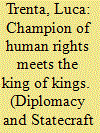

|
|
|
|
|
| Publication |
2013.
|
| Summary/Abstract |
Building on the recent re-discovery of the Iranian Revolution, this analysis examines the policies of the Carter Administration and their effects on Iran and the Iranian opposition. Starting with Jimmy Carter's election and hopes for a new era in American-Iranian relations, there occurred the progressive creation and expansion of a rift between the Carter Administration and the Iranian opposition. This rift was exacerbated by stubborn American support for an increasingly weak Shah, and by the complete unwillingness, both in Washington and at the American Embassy in Tehran, to meet with opposition members, let alone with Ayatollah Ruhollah Khomeini. In this sense, the horizon of the analysis of the origins of the Iran hostage crisis is expanded with a longer-term perspective. The taking of the hostages represented the final act of a troubled relationship that had probably begun before Carter took office.
|
|
|
|
|
|
|
|
|
|
|
|
|
|
|
|
| 2 |
ID:
124185
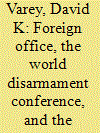

|
|
|
|
|
| Publication |
2013.
|
| Summary/Abstract |
The traditional interpretation of British foreign policy during the World Disarmament Conference has cast Britain as the honest broker, seeking to bring France and Germany together in a bid to square their respective differences over security and equality. But from the Foreign Office perspective, honest brokerage did not place Britain between Germany and France but between the ex-Allied Powers on one side and Germany on the other. This recasting of honest brokerage had two particular strands, with the Foreign Office desirous, first, to secure French support for any sort of disarmament programme before seeking German adherence and, second with an eye to the post-Treaty of Versailles international order, to circumscribe German military potential where at all possible. While the conference results remain the same, this interpretation alters the traditional role and suggested motivations of the Foreign Office between 1932 and 1934.
|
|
|
|
|
|
|
|
|
|
|
|
|
|
|
|
| 3 |
ID:
124192
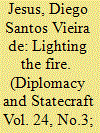

|
|
|
|
|
| Publication |
2013.
|
| Summary/Abstract |
Brazilian energy diplomacy intensified from 2003 to 2010. In this case, this intensification was related to the structure of more convergent preferences of Itamaraty-Brazil's Foreign Ministry-other related ministries, and agencies with foreign government preferences for engagement in energy security and/or integration. Co-extensive with these preferences were those of most Brazilian domestic actors on the diversification of the state's energy supplies, enhancement of access to markets or reserves, stimulus for sustainable production and use-mainly in developing states-and strengthening of strategic international partnerships-mostly with developed states-for training and the competitive insertion in the international market.
|
|
|
|
|
|
|
|
|
|
|
|
|
|
|
|
| 4 |
ID:
124184


|
|
|
|
|
| Publication |
2013.
|
| Summary/Abstract |
Between 1913 and 1917, Colonel Edward House, President Woodrow Wilson's closest friend and advisor, undertook several missions to Europe. Serving to shape House's attitude to American neutrality, House's advice deriving from these trips was extremely influential upon Wilson's foreign policy. This analysis examines the influences on House's advice, arguing that his pro-Allied stance evolved during this time and influenced Wilson's ultimate decision to have the United States enter the war on the Allied side. The primary influence on House's attitude was his relationship with British foreign secretary, Sir Edward Grey. Several factors drew the two men together. They meshed with House's pre-existing views on global geopolitics expressed in his novel, Philip Dru. Previous scholarship that has investigated House's trips to Europe tends to gloss over the intricacies of the House-Grey relationship. Whilst the two men shared a close friendship, examination of their correspondence and the observation of others suggests that Grey's diplomatic goal was to establish close Anglo-American relations, and that a close connexion with House furthered that aim. This connexion re-enforced House's pro-Allied attitude that, in turn, contributed to America's entrance into the war.
|
|
|
|
|
|
|
|
|
|
|
|
|
|
|
|
| 5 |
ID:
124186
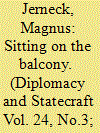

|
|
|
|
|
| Publication |
2013.
|
| Summary/Abstract |
Small states often seek power by exercising authority beyond their borders. Sweden, a prominent protagonist of the global projection of moral values, established itself as a champion of humanitarian internationalism in the post-Second World War period, especially during the Vietnam War. By voicing criticism of the American war effort and putting moral purposes beyond itself, Sweden tried to change American policy. Years of vehement criticism provoked strong reactions in the United States, leading to bilateral diplomatic crises and long-lasting political conflicts. Even though part of a wave of international criticism and based on the power of the better argument and conveyed through open advocacy, Sweden's public diplomacy had little bearing. Its confrontational style was counter-productive; its content badly synchronised with the domestic American debate and lacking originality and centrality; and the criticism generally considered irrelevant. Attention fell on Swedish verbal activism when more conspicuous elements of Swedish Vietnam policy were in focus.
|
|
|
|
|
|
|
|
|
|
|
|
|
|
|
|
| 6 |
ID:
124187
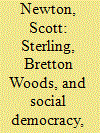

|
|
|
|
|
| Publication |
2013.
|
| Summary/Abstract |
Following the November 1967 sterling devaluation, the British Labour government of Harold Wilson struggled to defend the new exchange rate of £1?=?$2.40. Sterling's travails continued throughout 1968 and well into 1969 despite growing evidence that the external balance was moving into the black. Its problems arose from external difficulties, notably from the growth of footloose balances of foreign currencies-especially Eurodollars-within the international economy and from instability caused by the decline of the Bretton Woods system. Labour was determined to protect the new exchange rate, since a new devaluation or even a float would have led to a run on the pound, the collapse of its economic strategy, and the failure of its attempt to build a social-democratic order in Britain. It was successful in the end thanks to growing confidence in its policies and to belated international co-operation designed to salvage the Bretton Wood regime.
|
|
|
|
|
|
|
|
|
|
|
|
|
|
|
|
| 7 |
ID:
124190
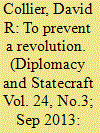

|
|
|
|
|
| Publication |
2013.
|
| Summary/Abstract |
John F. Kennedy came to power in 1961 with Iran on the verge of revolution against the Shah's unpopular policies. To stabilise the situation, his Administration attempted to promote democracy through a development plan based on the precepts of modernisation theory. Backed by academic theorists who argued that promoting democracy was the best way to secure victory in the Cold War, Kennedy developed an ambitious plan to transform Iran. This policy was seen as essential to replace the inevitable uncontrollable revolution and subsequent loss of Iran, with one controlled and directed by Washington. This analysis provides the first comprehensive examination of this plan and its foundations that has heretofore been overlooked. Kennedy's policy towards Iran illuminates the role that external powers can have in manufacturing, supporting, and encouraging a country's transition to democracy. Its failure, and the absence of any replacement plan to ensure political reform, made inevitable the uncontrollable revolution which eventually came in 1978.
|
|
|
|
|
|
|
|
|
|
|
|
|
|
|
|
| 8 |
ID:
124183
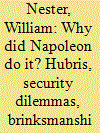

|
|
|
|
|
| Publication |
2013.
|
| Summary/Abstract |
This article explores the geopolitical and psychological reasons behind Napoleon's invasion of Russia.
|
|
|
|
|
|
|
|
|
|
|
|
|
|
|
|
|
|
|
|
|